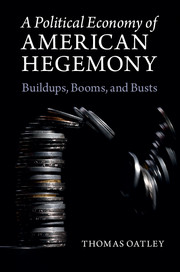Book contents
- Frontmatter
- Contents
- List of Tables and Figures
- Acknowledgments
- 1 The Political Economy of Imbalance
- 2 National Security Shocks and Military Buildups
- 3 Warfare, Welfare, and the Size of the American State
- 4 Military Buildups, Financial Power, and America's Postwar Booms
- 5 Deflecting the Costs of Adjustment
- 6 The Financial Consequences of America's Postwar Booms
- 7 The Political Economy of American Hegemony
- References
- Index
1 - The Political Economy of Imbalance
Published online by Cambridge University Press: 05 February 2015
- Frontmatter
- Contents
- List of Tables and Figures
- Acknowledgments
- 1 The Political Economy of Imbalance
- 2 National Security Shocks and Military Buildups
- 3 Warfare, Welfare, and the Size of the American State
- 4 Military Buildups, Financial Power, and America's Postwar Booms
- 5 Deflecting the Costs of Adjustment
- 6 The Financial Consequences of America's Postwar Booms
- 7 The Political Economy of American Hegemony
- References
- Index
Summary
I think everybody wants to get to the bottom of why this happened. What were the failures of regulation? Was it regulatory negligence? Was it regulations were not sufficient?
Steny HoyerThe fall of 2008 was momentous for the United States. Financial instability that had been simmering just beneath the crust of a deflating property bubble since the summer of 2007 erupted with full force in September. In a short span of time, the U.S. government took over Fannie Mae and Freddie Mac, the two government-sponsored entities that guaranteed half of all outstanding mortgage debt. Lehman Brothers was allowed to enter bankruptcy, Merrill Lynch was acquired by Bank of America, Washington Mutual was rendered insolvent and sold to JP Morgan, and Wells Fargo acquired Wachovia. Many of the banks that survived did so only because the federal government enacted an emergency $750 billion Toxic Asset Relief Program (TARP) that enabled rapid recapitalization, and the Federal Reserve Bank purchased mortgage-backed securities in unlimited amounts. As investors panicked in the face of the apparent meltdown of the American financial system, normally liquid credit markets froze and the crisis expanded into Europe. In all, some twenty-eight countries experienced systemic banking crises in 2008 and 2009. The financial crisis thus clearly marked the end of the credit boom that had driven the housing bubble through much of the previous five years.
In mid-November of that same year, the U.S. and Iraqi governments signed a Status of Forces Agreement by which the United States committed to remove its combat troops from Iraqi cities by June 30, 2009 and to withdraw all U.S. forces from Iraq by the end of 2011. The U.S. ambassador to Iraq and the Iraqi foreign minister signed the agreement in mid-November, and then President George W. Bush traveled to Baghdad in December for a formal signing ceremony.
- Type
- Chapter
- Information
- A Political Economy of American HegemonyBuildups, Booms, and Busts, pp. 1 - 26Publisher: Cambridge University PressPrint publication year: 2015



